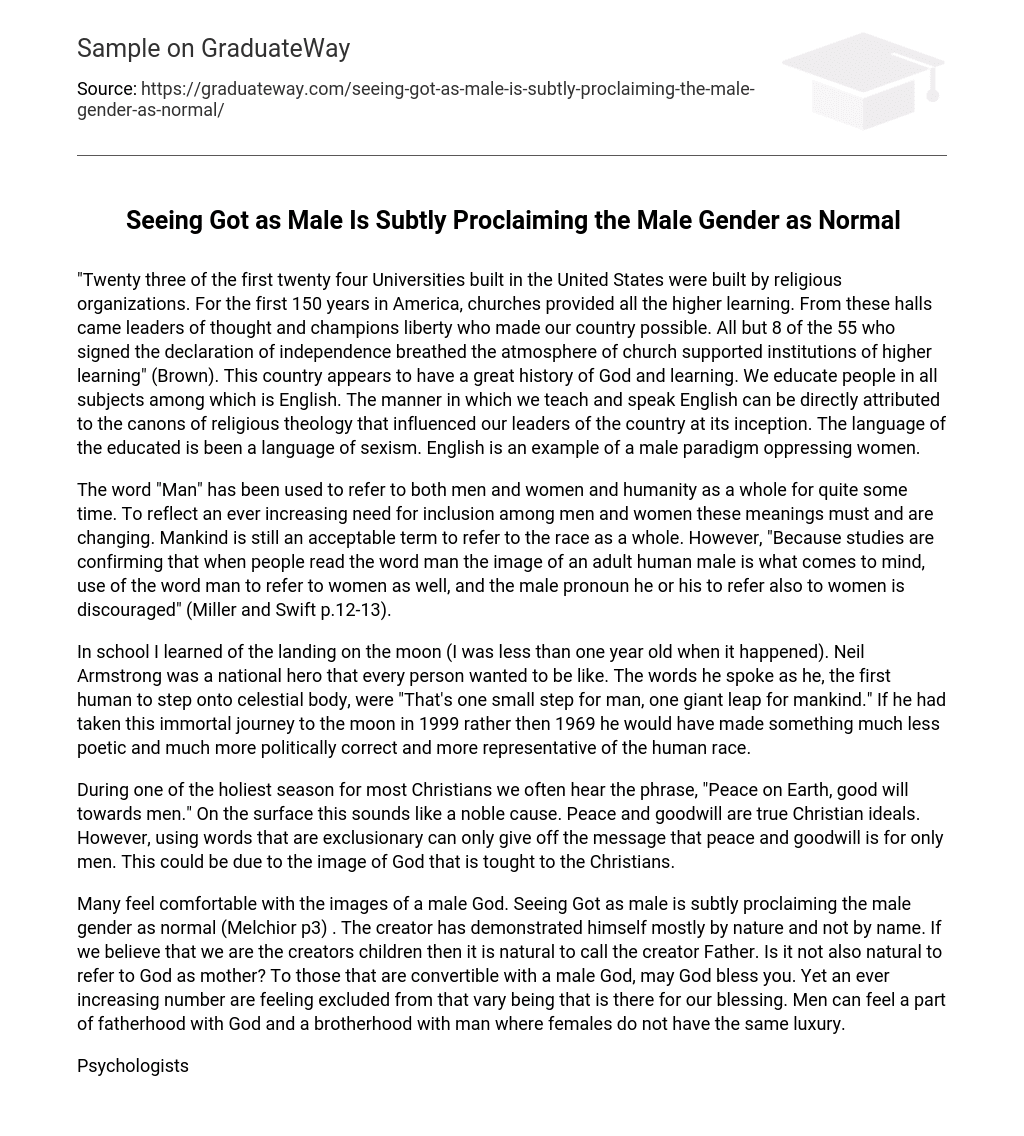“Twenty three of the first twenty four Universities built in the United States were built by religious organizations. For the first 150 years in America, churches provided all the higher learning. From these halls came leaders of thought and champions liberty who made our country possible. All but 8 of the 55 who signed the declaration of independence breathed the atmosphere of church supported institutions of higher learning” (Brown). This country appears to have a great history of God and learning. We educate people in all subjects among which is English. The manner in which we teach and speak English can be directly attributed to the canons of religious theology that influenced our leaders of the country at its inception. The language of the educated is been a language of sexism. English is an example of a male paradigm oppressing women.
The word “Man” has been used to refer to both men and women and humanity as a whole for quite some time. To reflect an ever increasing need for inclusion among men and women these meanings must and are changing. Mankind is still an acceptable term to refer to the race as a whole. However, “Because studies are confirming that when people read the word man the image of an adult human male is what comes to mind, use of the word man to refer to women as well, and the male pronoun he or his to refer also to women is discouraged” (Miller and Swift p.12-13).
In school I learned of the landing on the moon (I was less than one year old when it happened). Neil Armstrong was a national hero that every person wanted to be like. The words he spoke as he, the first human to step onto celestial body, were “That’s one small step for man, one giant leap for mankind.” If he had taken this immortal journey to the moon in 1999 rather then 1969 he would have made something much less poetic and much more politically correct and more representative of the human race.
During one of the holiest season for most Christians we often hear the phrase, “Peace on Earth, good will towards men.” On the surface this sounds like a noble cause. Peace and goodwill are true Christian ideals. However, using words that are exclusionary can only give off the message that peace and goodwill is for only men. This could be due to the image of God that is tought to the Christians.
Many feel comfortable with the images of a male God. Seeing Got as male is subtly proclaiming the male gender as normal (Melchior p3) . The creator has demonstrated himself mostly by nature and not by name. If we believe that we are the creators children then it is natural to call the creator Father. Is it not also natural to refer to God as mother? To those that are convertible with a male God, may God bless you. Yet an ever increasing number are feeling excluded from that vary being that is there for our blessing. Men can feel a part of fatherhood with God and a brotherhood with man where females do not have the same luxury.
Psychologists Alice Miller and John Bradshaw are believe patriarchal system, which holds the father is its head, the mother is of lesser value and the children are least important has produced unhealthy families (miller).
Educators teach children of the professional world and use language that continues to reinforce male superiority and female inferiority. “A director must be committed to the well-being of his company.” but “A nurse is expected to show her devotion by working long hours.” In addition, job names often include reference to the sex of the person: “We’re employing some new workmen on the project.” “I’m talking to a group of businessmen next Friday.” “The chairman cannot vote.” “He is a male nurse” “I have a woman doctor.” The use of such words tends to reinforce the idea that it is not normal for women to be in professional, highly-paid, technical and manual jobs. Also, that it is not natural for a man to work in such a caring (and generally poorly-paid) role as that of a nurse.
As a future educator myself I plan on making the language of the class truly inclusive. Avoid using pronouns that state a gender by replacing it with the plural, they, them ect. “If anybody calls, tell them I am busy.” Replace male pronouns with the combination “he or she,” “him or her” and “his or hers.” Use expressions or pronouns that do not support sexist assumptions about jobs. “Teachers must not be late for their classes.” “A chairperson should be fair to all her or his colleagues.” Use job names that apply equally to men and women. “The chairperson handed out notes of the last meeting.” “Mary is a very experienced camera operator.” “James is a nurse and Barbara is a doctor.” “We offer language courses for business people.”So we come to the end of the research or should I say the beginning of a journey. This journey will take a lifetime to complete. Yet the prize for completion will be a educational system that will have both genders included as equal.
Bibliography:Works sighted:Brown, Hugh B. , God is the gardener CD. BYU Graduation speech, Covenant Communications, 1962Melchior, Jeanne, “Gender Bias In The Urantia Book And New Paradigms of Reality.”Miller, Alice, For Your Own Good: Hidden Cruelty in Child Rearing and the Roots of Violence, Translated by Hildegarde and Hunter Hannum, New York: Farrar, Straus, Giroux, 1983.
Miller, Casey and Swift, Kate The Handbook of non-sexist language writing, New York: Harper and Row, 2nd ed., 1988.





